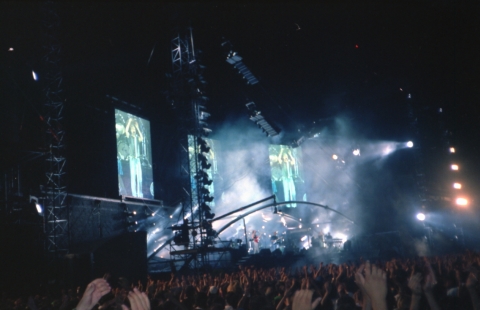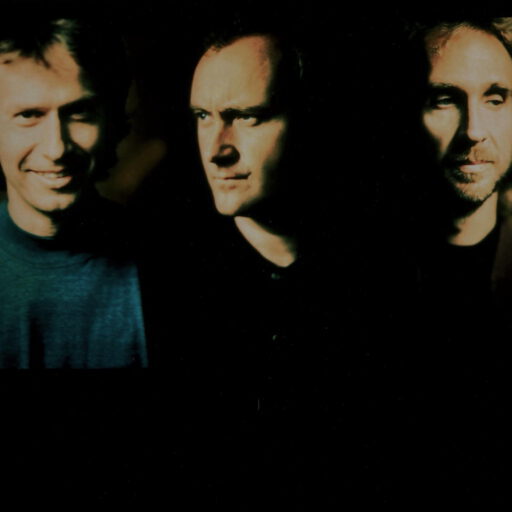On 18 September 1993, Genesis played their last gig with Phil Collins at Cowdray Ruins before he left the band.
Genesis in 1993
1993 was a quiet year for Genesis. In 1992, the group had been on their huge’We Can’t Dance tour‘ following their 1991 album We Can’t Dance*. 1993 saw them returning to their solo projects. Phil Collins’ marriage to his second wife Jill started to fall apart with the tabloid press publishing story over story about the family. Phil wrote and released his solo album Both Sides*, a very dark and angry and certainly his most personal album, which unfortunately did not go very well with the critics. In these turbulent times, Genesis only played one gig, when they resurfaced briefly for ‘a charity gig at Cowdray Ruins in aid of the King Edward VII hospice where they were joined by such rock alumni as Pink Floyd and the remaining members of Queen.’1
Queen performed a set of songs with Roger Taylor and Paul Young from Mike and the Mechanics on vocals. Then Genesis took the stage, but not with their regular live members Chester Thompson on drums and Daryl Stuermer on bass and guitar. Instead, Roger Taylor of Queen and Gary Wallis of Mike and the Mechanivs played drums for them and bass/guitar was played by Mike’s bandmate from Mike and the Mechanics, Tim Renwick, who also played with Pink Floyd.
Genesis’ reunion in the picturesque scenery among these famous headliners saw them playing ‘Turn It On Again’, ‘Hold On My Heart’, ‘I Can’t Dance’ and ‘Tonight Tonight Tonight’/’Invisible Touch’. According to some sources, they were also said to have played Phil Collins’s solo song ‘That’s Just The Way It Is’, but that is highly doubtable.
Next up was Pink Floyd who played some of their classic tracks from the 1970s, some also sung by Paul Young and with Mike on bass. Phil remembers: ‘The Floyd I’ve never loved apart from ‘Arnold Layne’. But we did this gig…I went to the sound check, and I was listening to the Floyd and a couple of the things they played I thought ‘I quite like that. There’s a couple of things in there that, you know. They show promise.”2
After Pink Floyd, Eric Clapton played a few songs (with Mike playing bass) and at the end, the ‘All Star Cowdray Ruins Band’, a band that featured everyone that had performed that night, played ‘Ain’t That Peculiar’, ‘Can I Get A Witness’ and ‘Gimme Some Loving’. YouTube videos and audio recordings of the show exist, but in a very low quality, which is a shame when considering this was Phil’s last gig with Genesis.
It was a successful, but ‘low-profile show’ and ‘few people would have ever believed that it was also Phil Collins’s final appearance with the band he’d now fronted for 18 unexpected years’3.
The show may have been one of the reasons for Phil to leave Genesis, as he remembers: ‘In the middle of my writing and making BOTH SIDES, Genesis did a concert with Queen. […] But I didn’t enjoy it … As I was singing these songs, it didn’t feel natural. Obviously, it was bad timing, going just like that from doing my most personal thing to a Genesis thing and back. But it definitely felt like ‘What am I doing here?’, like shoes that don’t fit anymore’.’4
Some time after this gig, Phil decided to leave Genesis, but his departure would not be announced until 1996. But that’s another story.
The line-up of the Cowdray Ruins band (according to the programme):
TONY BANKS: Genesis Keyboards
ERIC CLAPTON Guitar
PHIL COLLINS Genesis Vocals
JOHN DEACON Queen Bass
DAVID GILMOUR Pink Floyd Guitar
ADRIAN LEE Mike &. Mech Keyboards
NICK MASON Pink Floyd Drums
TIM RENWICK Mech./Floyd Bass/Guitar
MIKE RUTHERFORD Genesis Guitar/Bass
ROGER TAYLOR Queen Vocals/Drums
GARRY WALLIS Drums
RICHARD WRIGHT Pink Floyd Keyboards
PAUL YOUNG Mike &. Mech Vocals
Source: YouTube
Sources
Hewitt, Alan (2000): Opening The Musical Box. London: Firefly Publishing.
Platts, Robin (2007): Genesis. Behind the lines, 1967-2007. Burlington, Ont., Canada: Collectors Guide Pub.
Thompson, Dave (2005): Turn it on again. Peter Gabriel, Phil Collins & Genesis. San Francisco: Backbeat Books.
Title photo: Genesis in corcerto. Nizza – Luglio 1992 . Source: Wikimedia Commons, Valerio Ravaglia / CC BY (https://creativecommons.org/licenses/by/3.0).
* = affiliate links


